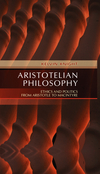Aristotelian Philosophy: Ethics and Politics from Aristotle to MacIntyreISBN: 978-0-7456-1977-4
Paperback
256 pages
March 2007, Polity
 This is a Print-on-Demand title. It will be printed specifically to fill your order. Please allow an additional 10-15 days delivery time. The book is not returnable.
Other Available Formats: Hardcover
|
||||||
Alasdair MacIntyre in Analyse & Kritik
"A clear, judicious history of Aristotelianism in Western
thought in order to explain the development of Alasdair MacIntyre's
thought. The book is exceptionally well organized, and the analyses
of the different interpreters of Aristotle - especially MacIntyre -
are intelligently concise and probing. Highly recommended [for]
upper-division undergraduates, graduate students and
researchers/faculty."
Charles E. Butterworth, Choice
"A very fine piece of scholarship ... [It] will be regularly
used for teaching at postgraduate level."
Peter McMylor, (author of Alasdair MacIntyre: Critic of
Modernity) writing in Philosophy of Management
"Well-structured and tightly packed without being impenetrable,
it should prove vital to contemporary work on Aristotelianism and
MacIntyre and more generally useful to advanced students of
political theory."
Journal of Moral Philosophy
"Just as we can be grateful to MacIntyre for his revitalization
of Aristotle in the present day, so too can we be grateful to
Knight for a lucid and valuable account of MacIntyre's own thought.
His book helps to clarify MacIntyre's philosophical lineage and in
particular to re-assert the continued importance of his early
Marxism. In so doing, it helps to make the case for "revolutionary
Aristotelianism" as not the oxymoron it might initially appear, but
rather a powerful contemporary alternative to both conservatism and
liberal democracy."
Notre Dame Philosophical Reviews
"Combines philosophical and historical erudition with clear
prose and a sympathetic tone, and is highly recommended to students
of the Aristotelian philosophical tradition as well as to anyone
interested in learning more about the origins and nature of
MacIntyre's distinctive Aristotelianism and its relationship to the
tradition."
European Legacy
"At times highly technical due to its depth and nuance of
complex concepts, Aristotelian Philosophy is a welcome
addition to college library and philosophical studies
shelves."
Midwest Book Review
"Writing with passion and on the basis of deep knowledge of the
evolution of MacIntyre’s thought, Knight argues convincingly
that he effects an anti-elitist reformation of Aristotelian
philosophy."
Political Studies Review
"Kelvin Knight puts his readers greatly in debt for this
masterful and erudite study of the history of Aristotelian
philosophy, with particular emphasis on MacIntyre's place in that
history. Notwithstanding his disclaimers in the conclusion, Knight
has in fact produced a clear account of 'the conceptual subtleties
and political implications' of MacIntyre's Aristotelianism
elsewhere unmatched."
Bruce Ballard, author of Understanding MacIntyre
"Philosophically and historically informed, but written in an
engaging and readable style, the book presents a stimulating and
often distinctive account of key phases in the development of
Aristotelian thought, culminating in an extended and sympathetic
discussion of the work of Alasdair MacIntyre. Knight's account of
MacIntyre's political philosophy is the best that I know of."
John Horton, University of Keele
"This is an impressive intellectual history, both with respect
to its account of the various receptions and transformations of
Aristotelian practical philosophy generally and with respect to its
account of the development and character of Alasdair MacIntyre's
own distinctive Aristotelianism. With respect to the former:
Aristotelianism is not a monolithic tradition, and Knight does a
masterful job in pulling apart the Aristotelianisms that are
elitist from those that are anti-elitist and in pulling apart those
Aristotelianisms that are conservative from those that are
revolutionary. With respect to the latter: MacIntyre's views are
widely caricatured by shallow writers, and we have been much in
need of an account of those views that shows just how radical and
anti-elitist MacIntyre's Aristotelianism is; Knight's book fulfils
this need with great thoroughness and skill."
Mark Murphy, Georgetown University



